Chronic Fatigue Sleep Optimization: Quality Focus
When living with chronic fatigue syndrome (CFS/ME), sleep becomes your most precious resource - and often your greatest challenge. Hours in bed don't automatically translate to energy restoration, making sleep quality far more important than sleep quantity.
Understanding how to optimize your sleep environment for maximum energy restoration can mean the difference between functioning and thriving with chronic fatigue.
📖 10 min read

Understanding Chronic Fatigue Sleep Dysfunction
Chronic fatigue syndrome disrupts normal sleep architecture, making restorative sleep elusive despite spending adequate time in bed. The result: waking exhausted regardless of sleep duration.

CFS Sleep Architecture Disruption:
- Reduced Deep Sleep: Stages 3-4 sleep diminished, limiting physical restoration
- REM Sleep Fragmentation: Mental restoration processes interrupted
- Alpha-Delta Sleep Anomaly: Wake-like brain activity during deep sleep phases
- Sleep-Wake Reversal: Circadian rhythm disruption affecting natural sleep timing
- Non-Restorative Sleep: Sleeping without feeling refreshed upon waking
Medical research indicates that chronic fatigue syndrome patients require optimized sleep environments because their sleep efficiency is compromised. Studies show that every factor affecting sleep quality becomes magnified in importance for CFS patients.
Deep Sleep Enhancement Strategies
Since CFS reduces natural deep sleep phases, your sleep environment must compensate by maximizing deep sleep potential during available windows.
Temperature Optimization for Deep Sleep
Core body temperature drop triggers deep sleep phases. Maintaining bedroom temperature at 65-68°F supports this natural process. Cooling mattress technologies help maintain optimal sleep temperature throughout the night.
Pressure Relief for Uninterrupted Sleep
Pain or discomfort that wouldn't wake healthy individuals can fragment CFS sleep. Memory foam with minimum 4-pound density provides medical-grade pressure redistribution, preventing micro-awakenings that disrupt deep sleep phases.
Motion Isolation for Sleep Protection
CFS patients often experience hypervigilance during sleep. Partner movement that typically goes unnoticed can trigger wake-ups. Advanced motion isolation protects fragile sleep cycles.
Energy Conservation Through Sleep Positioning
Chronic fatigue makes energy conservation critical. Your sleep positioning should minimize energy expenditure while maximizing restoration.
Energy-Efficient Sleep Positioning:
- Zero-Gravity Position: Reduces gravitational stress on organs and joints
- Spinal Alignment: Minimizes muscle work during sleep
- Pressure Distribution: Prevents energy-draining compensation patterns
- Circulation Support: Optimizes oxygen delivery to tissues
Adjustable bases provide therapeutic positioning options that can significantly reduce overnight energy expenditure.
The Firmness Balance for CFS
CFS patients need careful firmness balance: enough support to prevent muscle strain, sufficient pressure relief to avoid pain-induced wake-ups.
Optimal Firmness Considerations:
- Medium-Firm Foundation: Provides structural support without creating pressure points
- Contouring Comfort Layers: Memory foam or latex for pressure redistribution
- Progressive Support: Soft surface contact, firm deeper support
- Individual Sensitivity: CFS affects everyone differently; personal trial essential
Rachel from Eagle Place: "My chronic fatigue made me hypersensitive to pressure. My medium-firm memory foam mattress finally let me sleep without waking up sore."
Managing Sleep-Wake Cycle Disruption
CFS often disrupts natural circadian rhythms. Your sleep environment should support rather than fight your altered sleep timing.
Circadian Rhythm Support:
- Complete light blocking for daytime sleep when necessary
- Temperature regulation supporting natural rhythm cues
- Comfortable positioning for extended rest periods
- Quiet environment accommodating irregular sleep schedules
Multiple Rest Period Accommodation
Many CFS patients require frequent rest periods throughout the day. Your sleep surface should accommodate both nighttime sleep and daytime recovery rest.
All-Day Comfort Features:
- Consistent support for varying rest durations
- Easy position changes without energy expenditure
- Temperature regulation for day and night use
- Minimal motion transfer for undisturbed rest
Adjustable positioning becomes particularly valuable for CFS patients who may need elevated rest positions during symptom flares.
Post-Exertional Malaise Recovery
Post-exertional malaise (PEM) - the hallmark worsening of symptoms after minimal activity - often requires extended bed rest periods. Your sleep surface becomes a recovery center.
PEM Recovery Support:
- Extended pressure relief for prolonged bed rest
- Easy position changes to prevent complications
- Therapeutic positioning for symptom management
- Comfortable environment for extended recovery periods
PEM Recovery Positioning:
Cognitive Symptoms: Head elevation for improved cerebral circulation
Orthostatic Issues: Gradual position changes, leg elevation options
Pain Flares: Pressure relief and support adjustment capability
Fatigue Crashes: Maximum comfort for extended rest requirements
Temperature Sensitivity Management
CFS often involves temperature regulation difficulties. Some patients run persistently cold, others experience overheating, many fluctuate unpredictably.
Adaptive Temperature Solutions:
- Mattresses with variable temperature properties
- Layered bedding systems for quick adjustment
- Moisture-wicking materials for temperature fluctuations
- Breathable construction preventing heat buildup
Tom from Downtown Brantford: "My CFS makes me freeze one hour, overheat the next. My temperature-regulating mattress adapts better than I can."
Chemical Sensitivity Considerations
Many CFS patients develop multiple chemical sensitivities (MCS). Mattress materials must be carefully selected to avoid triggering additional symptoms.
Low-Toxicity Material Options:
- CertiPUR-US certified foams with low emissions
- Natural latex with minimal processing chemicals
- Organic cotton covers without chemical treatments
- Natural flame retardants rather than chemical treatments
Off-Gassing Considerations:
- Allow adequate ventilation period before use
- Choose brands with transparent material sourcing
- Avoid synthetic materials with strong odors
- Consider natural material alternatives where possible
Partner Considerations with CFS
CFS affects entire households. Partners may need to adjust their sleep habits to accommodate CFS management strategies.

Couple Sleep Solutions:
- Motion isolation preventing disturbance during symptom management
- Split-firmness accommodating different comfort needs
- Independent adjustability for individual positioning needs
- Larger sleep surfaces for medical equipment accommodation
Lisa and David's experience: "My CFS means irregular sleep schedules and frequent position changes. Our motion-isolating mattress lets David sleep while I manage symptoms."
Sleep Hygiene for CFS
Traditional sleep hygiene advice may need modification for CFS patients whose energy limitations affect bedroom maintenance.
Modified Sleep Hygiene:
- Easy-care bedding materials reducing energy expenditure
- Hypoallergenic materials reducing maintenance needs
- Simple position adjustment without complex procedures
- Bedroom organization supporting energy conservation
Professional CFS Sleep Assessment
CFS sleep needs require specialized understanding of energy conservation, symptom management, and recovery optimization.
At Mattress Miracle Brantford, we recognize that CFS patients have unique needs that go beyond typical comfort preferences. Our specialists take time to understand individual symptom patterns, energy limitations, and recovery requirements.
Investment in Functional Living
For CFS patients, quality sleep equipment represents investment in functional capacity and quality of life.
Functional Benefits:
- Improved energy conservation during rest
- Better symptom management through quality sleep
- Reduced PEM episodes through proper recovery support
- Enhanced daily function through restorative sleep
Consider that poor sleep can trigger or worsen CFS symptoms, potentially increasing medical costs and reducing already-limited functional capacity. Quality sleep surfaces become essential medical equipment.
Trial Periods: Critical for CFS
Given the unpredictable nature of CFS symptoms and individual sensitivity variations, extended trial periods become absolutely essential.
CFS-Specific Trial Considerations:
- Minimum 90+ night trials (full symptom cycle evaluation)
- Comfort adjustment options during trial period
- Understanding of variable symptom patterns
- No-pressure trial policies accommodating health limitations
Hope for Better Days
Living with chronic fatigue doesn't mean accepting poor sleep and constant exhaustion. Strategic sleep optimization can significantly improve energy levels, reduce symptom severity, and enhance quality of life.
Ready to optimize your energy restoration through better sleep? Visit our understanding Brantford showroom where we specialize in sleep solutions for complex medical conditions and energy conservation needs.
Explore our chronic fatigue therapeutic collection and discover how optimized sleep can become your most powerful tool for managing symptoms and conserving precious energy.
Frequently Asked Questions
What pillow is best for side sleepers?
Side sleepers need a thicker, firmer pillow to fill the gap between the shoulder and head. Look for medium to firm pillows with 4-6 inch loft. Memory foam or latex pillows work well as they contour to your neck curve.
What is the best pillow for back sleepers?
Back sleepers need a medium loft pillow (3-4 inches) that supports the neck without pushing the head forward. A slight contour under the neck curve helps. Memory foam or down alternative pillows work well.
What is the best material for sheets for hot sleepers?
Bamboo viscose and linen are best for hot sleepers. Both wick moisture and breathe better than cotton. Percale-weave cotton is the coolest cotton option. Avoid flannel, sateen, and synthetic materials which trap heat.
How can I sleep better at night?
Key tips: consistent sleep schedule, cool bedroom (18-20C), dark room, no screens 1 hour before bed, comfortable mattress and pillow. Avoid caffeine after 2pm and alcohol before bed. Regular exercise helps but not right before sleep.
How to Make the Best Sleep Decision
Follow these steps to choose the right sleep with confidence.
Step 1: Research your options thoroughly
Spend time understanding what is available in the sleep market. Read articles, compare features, and learn what separates quality from marketing. Informed shoppers consistently make better purchasing decisions.
Step 2: Define your priorities and budget
List what matters most to you in a sleep: comfort, durability, style, size, or specific features. Set a budget range that reflects the importance of this purchase to your daily life. Quality sleep affects everything.
Step 3: Seek expert advice
Talk to someone with real experience in sleeps. At Mattress Miracle, Brad has been helping families find the right sleep solutions since 1987. Expert guidance saves you from expensive mistakes and buyer's remorse.
Step 4: Test and compare before committing
Always try a sleep before buying when possible. Visit our Brantford showroom at 441 West St to test options side by side. Your body knows what feels right. Trust that more than any online review.
Step 5: Buy with confidence from a trusted retailer
Choose a retailer that stands behind their products with real warranty support and after-sale service. Mattress Miracle has been Brantford's trusted sleep store for over 35 years. Call 519-770-0001 or visit 441 West St.
Quick Answers
What temperature for sleeping? 15-19°C (60-67°F). Cooler than most people expect. Your body temperature drops when you sleep, and a cool room helps that happen.
How much sleep do I need? 7-9 hours for adults. But quality matters too - uninterrupted sleep is better than 9 hours of tossing and turning.
How do I fall asleep faster? Same bedtime every night. No screens an hour before bed. Keep it cool and dark. And honestly, a supportive mattress helps more than people realize.
Visit Mattress Miracle
Find us at 441 1/2 West Street, Brantford, Ontario. Rated 4.9 stars on Google. Family-owned since 1987.
Find Your Perfect Mattress at Mattress Miracle
We are a family-owned mattress store in Brantford, helping our community sleep better since 1987. Come try mattresses in person and get honest, no-pressure advice.
441 1/2 West Street, Brantford, Ontario
Hours: Mon-Wed 10-6 | Thu-Fri 10-7 | Sat 10-5 | Sun 12-4
Sources
- Walker M. Why We Sleep: Unlocking the Power of Sleep and Dreams. Scribner. 2017. ISBN: 978-1501144318.
- Okamoto-Mizuno K, Mizuno K. Effects of thermal environment on sleep and circadian rhythm. J Physiol Anthropol. 2012;31(1):14. DOI: 10.1186/1880-6805-31-14
- Krauchi K. The thermophysiological cascade leading to sleep initiation in relation to phase of entrainment. Sleep Med Rev. 2007;11(6):439-451. DOI: 10.1016/j.smrv.2007.07.001
- Haskell EH, Palca JW, Walker JM, Berger RJ, Heller HC. The effects of high and low ambient temperatures on human sleep stages. Electroencephalogr Clin Neurophysiol. 1981;51(5):494-501.

